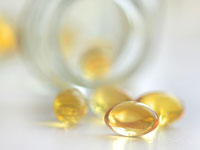
If you're having trouble eating a healthy amount of fruits, vegetables, grains, and healthy fats, you may be hoping to fill those holes in your diet with a pill.
Problem is, pills don't really work. "I get asked a whole lot about supplements and vitamins," says Laurence Sperling, director of preventive cardiology at the Emory University School of Medicine, in Atlanta. "And what we have to say right now is that we do believe that a heart-healthy diet, a balanced diet is beneficial. We recommend only a multivitamin. And no high doses of supplements."
In multitudes of studies, one supplement after another has failed to benefit the heart in any measurable way. That includes antioxidants as well as B vitamins such as folic acid, which does not seem to prevent heart disease.
A 2004 review of previous studies found that vitamin E supplements were no help for treating or preventing heart disease
A 1994 study of smokers found that beta-carotene supplements didn't protect the heart, but they did raise the risk of lung cancer.
"While fruits, vegetables, and other whole foods clearly protect the heart, it's evidently impossible to capture that power in a pill," says Melissa Ohlson, RD, coordinator of the Cleveland Clinic's preventive cardiology and rehabilitation nutrition program.
Fish oil is the exception
People with heart disease may want to take fish oil capsules after talking with their doctors. The omega-3 fatty acids in fish oil can help prevent arrhythmias, decrease triglycerides (a type of fat in the blood), slow down the buildup of plaques in the arteries, and slightly lower blood pressure.
Lead writer: Chris Woolston
Last Updated: April 09, 2008

No comments:
Post a Comment